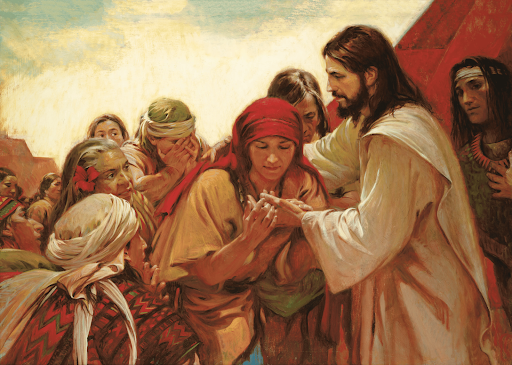
When members of The Church of Jesus Christ of Latter-day Saints (often referred to as Mormons) are asked, “are Mormons Christians?”, the answer is a resounding yes. However, this question still continues in public discourse. To understand why people’s opinions differ so much, it helps to look at both the similarities and differences between the Latter-day Saint faith and most Christian denominations.
Common Ground: Core Beliefs About Jesus Christ
When researching Mormonism, it isn’t difficult to see that Jesus Christ is at the heart of Latter-day Saint belief. Members of the Church worship God the Father in the name of Jesus and center their faith on His life, teachings, and divine mission. In fact, the symbol for Mormonism is an image of Bertel Thorvaldsen’s Christus, a famous statue of the resurrected Christ.
Latter-day Saints believe Jesus is the Son of God, born of a virgin in Bethlehem. He lived a perfect life, taught the gospel, performed miracles, suffered for the sins of the world, died for our sins, and rose again in a literal, physical resurrection.
Latter-day Saints also believe that Jesus’ atonement makes salvation possible for everyone. They emphasize that while personal effort, repentance, and ordinances such as baptism are necessary, they are not enough on their own. As taught in the Book of Mormon, “it is by grace that we are saved, after all we can do.” This reliance on the “merits, mercy, and grace” of Jesus Christ is quite similar to Christian views across many traditions.
Moreover, Latter-day Saints revere the Bible as scripture. They believe that Jesus’ teachings in the New Testament provide the pattern for Christian life today, and that His Church was originally established to bring about the unity and perfection of the saints.
Why Some Christians Disagree
Despite these foundational beliefs, some Christians argue that Latter-day Saints fall outside the bounds of Christianity. Concerns about the question of are Mormons Christian typically come from three main differences:
- Rejection of post–New Testament creeds
- Belief in a restored rather than reformed church
- Use of additional scripture beyond the Bible
Here’s a closer look at each.
1. Different View of the Godhead
One major difference in Christianity vs Mormonism is how Latter-day Saints understand the nature of God. Unlike the doctrine of the Trinity, which describes God as one substance in three persons (Father, Son, and Holy Spirit), Latter-day Saints believe the Godhead consists of three distinct beings united in purpose.
This belief is rooted in the New Testament and in early Christian understandings of God before the formulation of creeds in the third and fourth centuries. Latter-day Saints contend that later Christian doctrine was influenced by Greek philosophical concepts, such as the immutability and timelessness of God, which they believe are foreign to the original teachings of Jesus and His apostles.
For Latter-day Saints, God the Father has a tangible, glorified body. Jesus Christ is His Son, resurrected and exalted, and the Holy Ghost is a spirit. They believe this understanding restores the clarity and simplicity of early Christianity’s view of the divine.
2. Belief in a Restored Church
Mormonism does not identify with any of the historical Christian branches: Catholic, Orthodox, or Protestant. Rather, they believe that following the deaths of the original apostles, a great apostasy occurred, and divine authority and essential truths were lost.
They believe that Jesus Christ restored His Church through the Prophet Joseph Smith in the early 19th century by divine revelation and the ministering of angels. Through this restoration, priesthood authority and sacred ordinances were brought back to earth. Latter-day Saints view their faith not as a new church, but as the reestablishment of the original Church of Jesus Christ.
Converts from other Christian backgrounds often see the transition not as a departure from Christianity, but as a continuation or fulfillment of their Christian journey.
3. Open Canon of Scripture
While many Christian denominations adhere to the doctrine of sola scriptura—the idea that the Bible alone is the final authority—Latter-day Saints accept an expanded canon. In some views this can complicate the question of is Mormonism Christian. In addition to the Old and New Testaments, they accept the Book of Mormon, Doctrine and Covenants, and Pearl of Great Price as sacred scripture.
The Book of Mormon is described as “Another Testament of Jesus Christ,” and refers to Him by name nearly 4,000 times. It affirms His divine sonship, His atoning sacrifice, and His role as the Savior of the world.
Latter-day Saints believe that ongoing revelation is part of God’s plan. They believe that the Bible does not claim to be the final word of God, and that God continues to speak through modern prophets today. This belief in continuing revelation is a significant difference from most Christian groups. However, it also offers a sense of dynamic, living faith that is deeply centered on Christ.
A Call for Christian Unity
Despite these differences, Latter-day Saints make it clear that they don’t want Christianity vs Mormonism to distance themselves from other Christians. They actually emphasize collaboration and mutual respect. Doctrinal disagreements have always existed among Christians, even among the earliest followers of Jesus. And they affirm that sincere worshippers in all traditions who love and follow Christ shouldn’t be branded as non-Christian simply because of differences in interpretation or practice.
Leaders of the Church have stated: “There is no good reason for Christian faiths to ostracize each other when there has never been more urgent need for unity in proclaiming the divinity and teachings of Jesus Christ.”
So, are Mormons Christians? By any fair measure of belief in, devotion to, and discipleship of Jesus Christ, the answer is yes. Latter-day Saints affirm Jesus as the Son of God, Savior of the world, and central figure of their faith. They believe in His birth, ministry, atonement, death, and resurrection, and seek to follow His example in daily life. At the same time, they differ from traditional Christian denominations in ways that are meaningful and important to them. These differences reflect their belief in a divinely led restoration rather than a reformation.
Understanding these similarities and differences can lead not to division, but to deeper dialogue. In a world that often emphasizes what separates us, taking time to appreciate one another’s faith in Christ—however it may be expressed—is a powerful act of unity.

By Todd Noall, Source Expert
Todd Noall is an author and religious scholar at Mormonism Explained with a focus on the history and theology of religion.

Fact Checked by Mr. Kevin Prince, Source Expert
Kevin Prince is a religious scholar and host of the Gospel Learning Youtube channel. His channel has garnered over 41,000 subscribers and accumulated over 4.5 million views. Mr. Prince also created the Gospel Learning App, a reliable platform where individuals seeking truth can access trustworthy answers to religious questions from top educators worldwide.
About Mormonism Explained
Mormonism Explained is a resource that was designed to provide objective and factual information about Mormonism, its history, doctrines, and policies. Our team of researchers consults experts and primary sources to present factual information on a variety of topics relevant to the Mormon Church.
